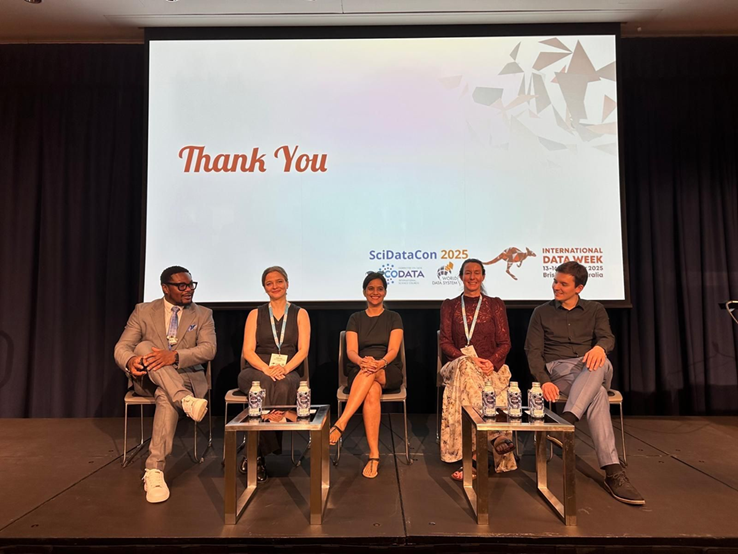Reflections on the ECR-organized session ‘Perspectives on Data Repositories across Disciplines, Geographies, and Cultures’ from CODATA Connect leads Pragya Chaube, Louis Mapatagane, and Cyrus Walther.
 At International Data Week 2025, the Early Career Researcher (ECR) session, “Perspectives on Data Repositories Across Disciplines, Geographies, and Cultures,” was more than just a panel; it served as a quiet manifesto. It reminded us that data repositories are not storage systems; they are knowledge goods. And knowledge goods, by their very nature, depend on participation, inclusion, and shared stewardship.
At International Data Week 2025, the Early Career Researcher (ECR) session, “Perspectives on Data Repositories Across Disciplines, Geographies, and Cultures,” was more than just a panel; it served as a quiet manifesto. It reminded us that data repositories are not storage systems; they are knowledge goods. And knowledge goods, by their very nature, depend on participation, inclusion, and shared stewardship.
The session presented a rare cross-section of real-world frictions: genomic data implicate sovereignty, particle-physics data that overwhelm infrastructure, human rights data requiring machine readability for accountability, disparities in climate science data, and open research data cultures where practice lags behind aspiration. The ECR panel converged on a single truth: if data are to serve humanity, then the design architecture of the next generation of repositories that hold them must overcome these frictions and reflect humanity’s diversity.
Sovereignty Before Structure
The scientific and infrastructural requirements of genomics highlights to us that repositories are never merely technical artefacts. But as Claire Rye reminded us through her work on genomic data in Aotearoa New Zealand, no repository is ethically sound if it fails to respect sovereignty. Te Tiriti o Waitangi (‘Treaty of Waitangi’ – founding document of New Zealand, signifies partnership between the British Crown and Māori) affirms that taonga Māori (full chieftainship of indigenous possessions), including genetic data, remain under Indigenous authority. This is not an afterthought to FAIR; it is the foundation of what the CARE (Collective Benefit, Authority to Control, Responsibility, Ethics) principles demand. When we speak of openness, we must first ask: open for whom, and on whose terms? Without community control and benefit-sharing encoded in governance and metadata, openness risks becoming another form of extraction.
Scale Without Participation Reproduces Inequality
In high-energy physics, the problem is not a lack of collaboration or data but the asymmetry of participation. As Cyrus Walther illustrated, experiments such as the Large Hadron Collider (LHC) or Square Kilometer Array Observatory (SKAO) generate petabytes of data — but access to those data, and to the computational ecosystems required to analyse them, is not always given. Here lies a paradox: the most open scientific projects can still be closed in practice. Membership fees, specialised software, and critical know-how determine who gets to participate in knowledge production. If repositories are to be truly open, they must democratise capability. That means designing open collaboration structures such as Cherenkov Telescope Array Observatory (CTAO) and open methods that allow researchers from the Global South and early-career scientists to contribute meaningfully as co-authors of discovery.
Read more on the CODATA blog https://codata.org/blog/2025/11/07/building-participatory-data-infrastructures-across-disciplines-and-geographies/
